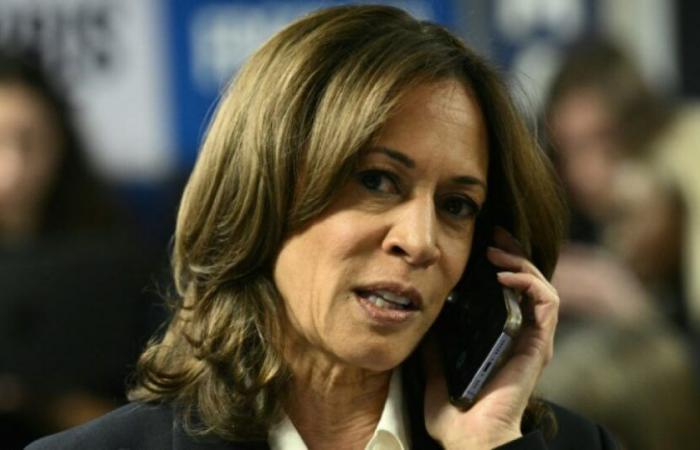The overwhelming weight of the themes of immigration and inflation, the pro-Trump vote of male, black or Latino voters, an entry into the campaign that was too late and not sufficiently distanced from Joe Biden: here are the crucial reasons explaining the defeat of Kamala Harris.
– The heavy impact of the economy
“The economy, stupid”: this is the famous quote that has gone down in history from Bill Clinton's chief strategist, Jim Carville, to explain the Democratic president's victory in 1992.
Thirty years later, post-pandemic inflation and high prices for gasoline and basic necessities have seriously damaged the candidacy of Kamala Harris and the record of President Joe Biden, against which Donald Trump has continued to oppose to type.
“Inflation played an important role” among other elements, such as immigration, underlines Bernard Yaros, economist for Oxford Economics. And, he told AFP, even if “inflation has slowed, this does not seem to have benefited the ruling party.”
– The “failure” on immigration
President-elect Donald Trump has constantly denounced the illegal immigration of millions of “criminals” throughout his campaign, whom he promised to deport on a massive scale.
A speech that hit the mark with his electoral base, which he even expanded: Carl Tobias, professor of law at the University of Richmond, thinks that “immigration was clearly a factor in Trump's victory, an issue he has insisted on since his 2016 campaign with his speeches on the wall, the invasion and the threats to American jobs.
Especially since the Republican candidate slammed the “failure” of Kamala Harris who was responsible as vice-president for migration policy in the United States but which he denounced as a “border” policy. open” with Mexico.
– A new electoral demographic
According to two large exit polls from Edison Research and CNN, African-American support for Donald Trump increased from 8% to 13% between 2020 and 2024, and from 32% to 45% among Latinos. . A worrying sign for Democrats of the changing demographics of its base.
According to Roberto Suro, a professor at the University of Southern California, “there has definitely been a steady movement toward Trump, election after election, among Mexican-American, evangelical (Christian) men, without a college degree, and working-class people.” election”, particularly because they are traditionally conservative on social issues.
And, against all expectations, Donald Trump did better than in 2020 with women – despite the mobilization on abortion – and youth.
For Hillary Mouafong, 21, an African-American computer science student at Georgia State University who voted for Harris, the latter “counted on the African-American vote which, in the end, let her down.”
“A lot of people didn’t go to vote, especially a lot of young people,” she said.
– Arriving too late in the campaign
By announcing, in April 2023, his intention to run for the White House, Joe Biden had already aroused reservations among many Democrats at the time.
But the tenors of the party chose to remain silent and align themselves behind the second candidacy of the octogenarian president, denying month after month the clear signs of the decline of the man who claimed to be the only one who could beat Donald Trump.
When it was necessary to replace Joe Biden urgently, in July 2024, Kamala Harris only had three months left to make up for her notoriety deficit and dispel the impression that she had not really had time to prepare. a government program.
“This Democratic disaster is largely attributable to Joe Biden. He should never have tried to run again at the age of 80, ultimately leaving Harris to manage a short surrogate campaign that proved inadequate,” summarizes Larry Sabato, political scientist at the University of Virginia.
– His difficulty in differentiating himself from Biden
Americans overwhelmingly rejected the presidency of Joe Biden, and Kamala Harris differentiated herself far too late from the president, particularly unpopular on the themes of the economy and immigration, or even criticized for her support for Israel.
The vice-president found herself trapped on October 8, on an ABC set, when she was asked if she would have acted differently than Joe Biden during the last four years. After a moment's hesitation, she replied, “Nothing special comes to mind.”
This exchange turned out to be “disastrous” for the Democratic candidate, David Axelrod, former adviser to Barack Obama, said on CNN on Wednesday.
Donald Trump made no mistake: at each of his electoral rallies, he projected this decisive moment on the big screen, which he also exploited to the extreme in his campaign clips.






